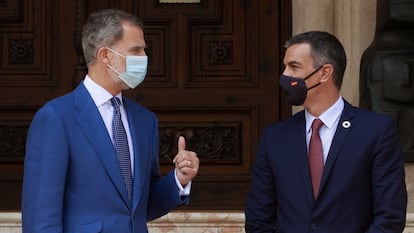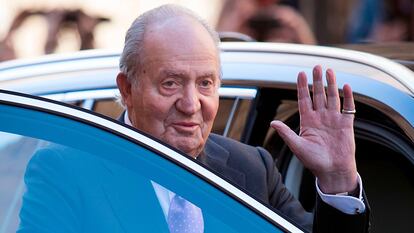Spanish PM refuses to reveal whereabouts of emeritus king Juan Carlos
Pedro Sánchez says it is up to the Royal Household and not the government to inform the public of the location of the former monarch

It has been nearly 10 days since Spain’s emeritus king, Juan Carlos I, made the surprise decision to leave the country as pressure rose due to revelations about his finances. Since August 4, the whereabouts of the father of the current monarch, Felipe VI, have been unknown, something that is becoming an uncomfortable issue for the central government. Questioned by reporters on Wednesday, Prime Minister Pedro Sánchez said that the responsibility for providing information as to the former king’s whereabouts lie with the royal household and Juan Carlos himself. “We are different institutions,” he insisted.
The government is trusting that, given the ongoing coronavirus crisis and economic strife, the country’s institutions will provide stability in the face of the shock move by the emeritus king. In La Moncloa prime ministerial palace, they are aware that the situation continues to create tensions, but they believe that citizens have bigger issues to worry about, such as the pandemic, jobs and the state of the economy.

But the location of Juan Carlos, who is being investigated by Swiss and Spanish prosecutors over bank accounts allegedly held in tax havens, is adding another uncomfortable element to the ongoing crisis for the government. For the moment, the administration has opted to respect the decision – which may have been taken by Juan Carlos or his son, King Felipe VI – to keep his whereabouts secret, despite the political damage it is doing.
On Wednesday, Sánchez tried to distance his administration from the Royal Household, and deflect questions from reporters, including those from international media outlets such as The New York Times. The prime minister made a brief appearance before journalists after speaking with King Felipe on Wednesday during their traditional summer meeting at the Marivent palace in Palma de Mallorca.
His conversations with the head of state, he said, are subject to the “appropriate confidentiality,” and as such he would not be revealing the information he has at his disposal. “The issues that need to be conveyed linked to the subject that you have referred to should be from the Royal Household or the person involved themselves and not the executive power,” Sánchez said yesterday in response to a journalist’s question, avoiding expressly mentioning Juan Carlos I by name.
The media has claimed that Juan Carlos is in Portugal, the Dominican Republic, the United Arab Emirates and even New Zealand
The Royal Household, for its part, has opted not to reveal the location of the emeritus king, on the basis that he is a private citizen and that he will announce where he is located when and if he considers it convenient to do so.
But Juan Carlos I still holds the honorary title of king of Spain, he travels with a diplomatic passport, he continues to form part of the royal family, he enjoys protection from Spain’s lower courts and has not renounced his dynastic rights. The government is fully aware of his location, given that he is traveling with four bodyguards from the Royal Household’s security service, which is headed up by a Civil Guard colonel. In the race to locate him, the media has claimed that he is in Portugal, the Dominican Republic, the United Arab Emirates and even New Zealand.
The meeting on Wednesday between Sánchez and Felipe VI was the first official encounter since the news about the emeritus king’s exit from Spain was announced. The pair spoke for around an hour, the PM explained afterwards, and they focused on the coronavirus crisis, the economic emergency and the international situation. Speaking after the meeting, Sánchez emphasized the severity of the current situation across the world due to the pandemic, and linked it to the need for stable institutions, a message that was clearly aimed at strengthening the monarchy. “The worse the situation, which is extraordinarily complex due to the pandemic, the more important the normal functioning of public institutions is,” he said.
English version by Simon Hunter.
Tu suscripción se está usando en otro dispositivo
¿Quieres añadir otro usuario a tu suscripción?
Si continúas leyendo en este dispositivo, no se podrá leer en el otro.
FlechaTu suscripción se está usando en otro dispositivo y solo puedes acceder a EL PAÍS desde un dispositivo a la vez.
Si quieres compartir tu cuenta, cambia tu suscripción a la modalidad Premium, así podrás añadir otro usuario. Cada uno accederá con su propia cuenta de email, lo que os permitirá personalizar vuestra experiencia en EL PAÍS.
¿Tienes una suscripción de empresa? Accede aquí para contratar más cuentas.
En el caso de no saber quién está usando tu cuenta, te recomendamos cambiar tu contraseña aquí.
Si decides continuar compartiendo tu cuenta, este mensaje se mostrará en tu dispositivo y en el de la otra persona que está usando tu cuenta de forma indefinida, afectando a tu experiencia de lectura. Puedes consultar aquí los términos y condiciones de la suscripción digital.








































